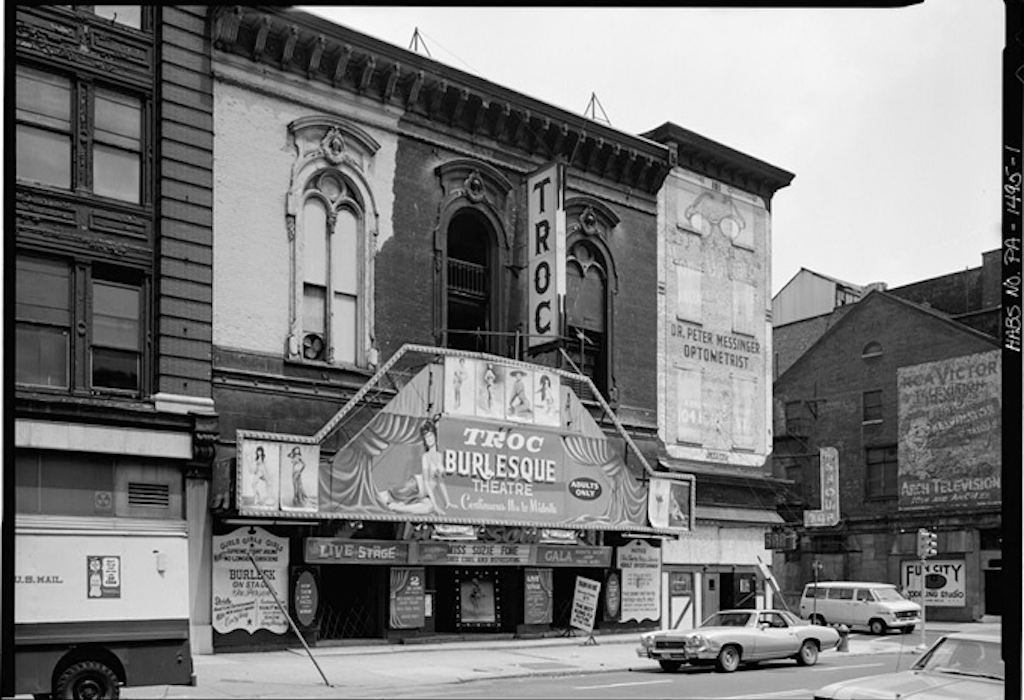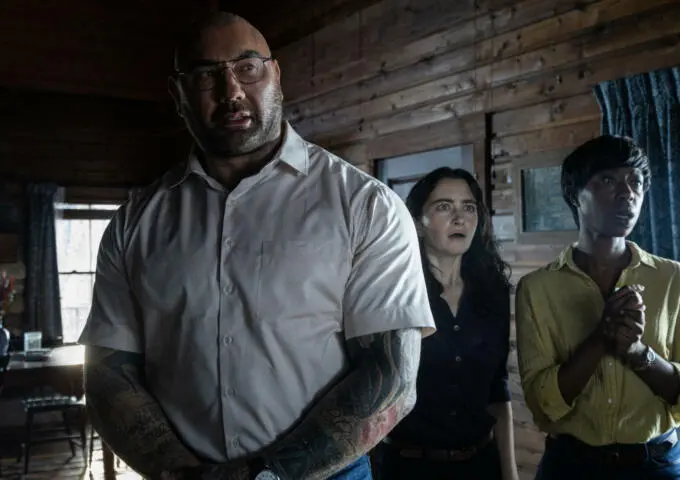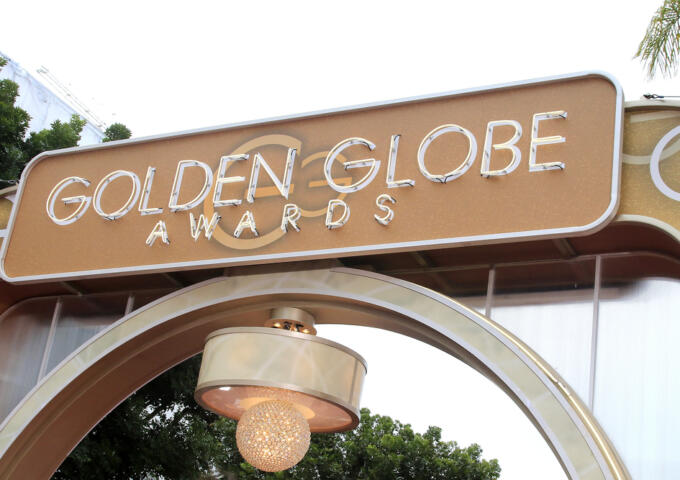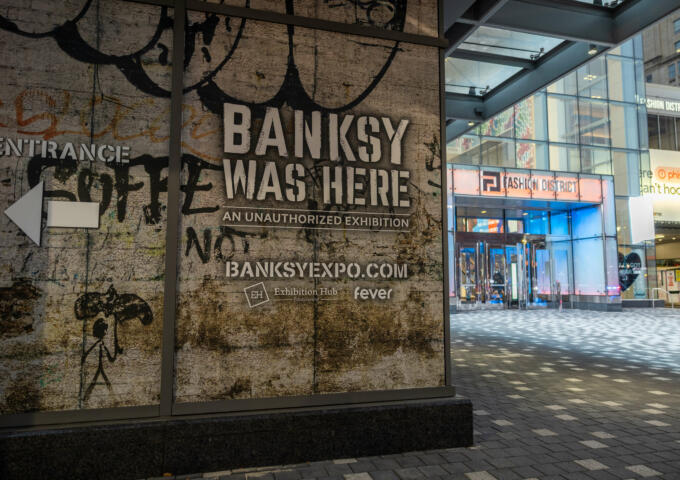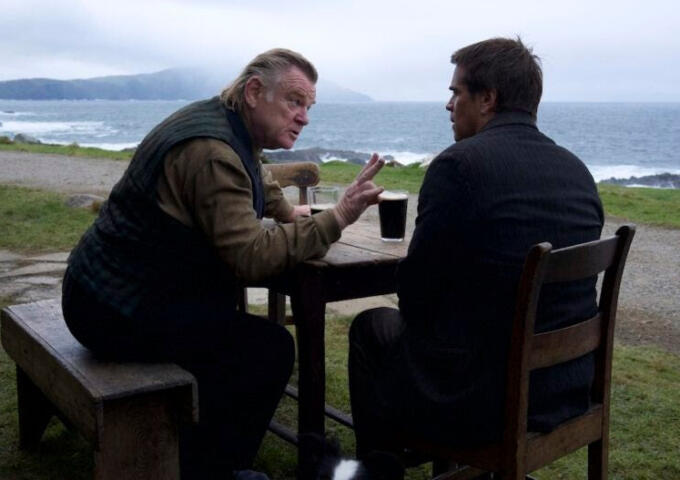It’s a warm evening at the end of April, and two long lines are snaking around Arch Street’s Trocadero Theatre in either direction.
The usual pandemonium around the Troc’s front entrance is something that accompanies any packed-tight night at Chinatown’s venerable venue dedicated to indie rock, metal, burlesque and comedy. This particular night, the buzz has doubled down with two shows featuring comedian Pete Davidson.
The “Saturday Night Live” star is a hot commodity (a movie on his life is to be directed by Judd Apatow, and he’s made recent headlines regarding his relationships with Ariana Grande and Kate Beckinsale). He slipped in these Troc gigs at the last minute between Pennsylvania dates with fellow comedian and pal, John Mulaney.
Several past Troc employees and managers mingle with the current crew, exchanging hugs and laughs. If the show inside the Troc is half as good as the one outside, this will be memorable.
No sooner than Davidson hits the Troc’s long, deep stage, the flinty-voiced New York comic pounces on the elephant in the room.
And it has nothing to do with Ariana or Kate.
“So, I hear this place is closing,” he said, matter-of-factly. “That’s a shame.”
The lanky stand-up comedian asks rhetorically why the Troc is shuttering. “Are they tearing this place down, probably putting up a parking lot? They can use another one in this city – the parking sucks.” Later, he warns, “Don’t clap, or I’m never coming back here… Oh, this place is closing, so I can’t anyways.”
As of June 1, no one can come back to the Trocadero. At least, not until current owner-operator Joanna Pang sells it to someone who, hopefully, wants a used opera-house-turned-vaudeville-hall-turned-strip-joint-turned-Chinese-martial-arts cinema-turned-indie-rock-palace.
1870 | The Troc opens originally as the Arch Street Opera House, showing minstrel shows and musicals.
The last two nights of the current iteration of the Troc will feature cabaret performances from Big Mess Cabaret on May 31 and June 1. It was cabaret that opened the doors to the Troc when current owner Pang took it over. Following those two dates, it’ll be official: the 1,200 GA capacity room, built as the Arch Street Opera House in 1870 and renamed the Trocadero in 1896, will then close.
No more Movie Mondays, which ended in recent weeks. Robert Drake’s Zombie parties ended Saturday. Dancing Ferret’s Dracula’s Balls close out May 18. An all-day, all-ages final call for local 90s-centric rock bands (Dandelion, Three4Tens) is May 19. Even Carmen Martella III’s caustic Skeletor character and his frat-famous Karaoke Gung Show must vacate the Victorian-tinged premises as of May 25.
On May 31, the Troc’s neighbor in Space 1026, the art gallery and collective, also leaves the block, having had its original home sold out from under it (fear not, Space 1026 is relocating to a former beauty shop on North Broad). This, however, marks the end of a crusty, DIY era and its accompanying glamor within Chinatown.
“That block of Arch in Chinatown was a beacon at a very important time — the early-to-mid 1990s — when indie rock needed places and outlets for it to survive and thrive,” said neighboring MAGNET magazine magnate Eric Miller, whose offices reside across from the Troc and next to 1026. “Philly needed those things to have a place on the national map, proving we weren’t some second-rate town between NYC and [Washington] D.C.”
Miller didn’t hold back on what the establishments that took up space along that section of Arch Street meant to the community and Philly’s music scene.
“When MAGNET moved to Arch, that block —hampered by having the bus station smack in the middle of it — had us, the Troc, Decibel mag and Space 1026 all doing our things,” he said. “If a bomb wiped out that block then, the indie rock/punk/metal/skate/art world would have suffered a major loss. Then again, in typical Philly fashion, you could walk down that block and never know those things were even there. Losing the Troc as a music venue isn’t just a crushing blow for Philly’s music scene and what it’s becoming, it’s a huge loss for the city. Those walls have seen lots of this city’s most important musical history, but like most of us, they were probably too drunk and high to remember most of it.”
‘This was home to me’
What might the Trocadero Theatre sell for dollar-wise? Neither Pang or anyone on-or-off the record would discuss costs. As the property for neighboring Space 1026 sold for between $1.6 million (according to Redfin) and $3.3 million (according to Zillow), it’s fair to say that the larger 14,516 square feet-sized Troc could net a comparable price.
“It’s worth a bundle, even though there is a LOT of work to be done in there,” said one anonymous source close to the ins-and-outs of the property. “Don’t think there’s been any money put toward renovation in 20 years.”
According to a recent check of property records, Pang also owned Brewerytown’s North Star Bar property, set to re-open as a restaurant-beer garden, as well as 1227 Walnut Street’s Chatayee Thai, the one-time home to Portofino, Walnut Street Supper Club and Cibo.
Many of the reasons that the Troc is closing are clear.
Pang is the daughter of Stephen Pang, who purchased the Troc in 1979 and operated it as a Chinese-themed cinema through the early 1980s until Rick Blatstein bought and transitioned the venue into a rock club in 1986.
Brothers David and Stephen Simons took it over in 1991.
Pang said her decision to sell her beloved theater was akin to losing a family member.
“This was home to me,” Pang said, days after rumors of the Trocadero’s imminent closure, on the heels of promoters pulling their shows from the schedule. “For real, I used to run around the Troc as a kid.”
Pang offered personal reminiscences about how the Troc affected her, and how she hopefully affected the Troc. “We’re proud of what we’ve done for the last 20 years, not only in regards to the music scene, local and national, but beyond, too. We were an independent room that could embrace and pursue every aspect of multiculturalism, from drag performers to zombie proms to LGBTQ events. We were dedicated to welcoming every and all artistic scene. I’m proud of that. But it’s time.”
1950s | Troc becomes full-fledged burlesque venue hosting some of the world’s best professional showgirls.
With that, Pang spoke of how the business landscape has changed in the last five years.
“It’s harder now to be an independently run venue. It’s a different world. There are bigger rooms run by much bigger concert corporations than me,” she noted, talking (presumably) about Live Nation’s recently opened rooms in the Met Philadelphia and the Fillmore, AEG/Bowery Presents’ takeover of the old Electric Factory (now Franklin Music Hall), or University City’s World Café Live and the Eraserhood’s Union Transfer.
All of these venues offer fans a less grungy alternative to the Trocadero’s tattered (literal) Victorian grandeur.
Soon to offer more competition is the Center City outpost of City Winery, the NYC-based adult-oriented live music venue opening in the Fashion District Philly building known as the Gallery at Market East.
“Mostly, though, I’m tired, you know?” Pang said with a mix of sadness and weariness. “I’ve been at this for a while. It’s time to let someone else take a shot at it, maybe.” Pang wouldn’t comment on sales price nor potentially interested parties, with the latter including those close to her who contacted her in April wanting to lease the Troc. “I’ll need a real break after that last Big Mess show,” she said.
Some have called Pang tough to work for and with. Some say she was a sweetheart to work for and with. Having worked for her as an independent promoter early on, this reporter genuinely found her fair and easy, even willing, to collaborate.
“Joanna was the reason burlesque itself was represented there,” said Peek-A-Boo Revue co-founder Scott Johnston. His show and Pang’s Troc were partners in playful mischief when it came to the modern burlesque revival. Johnston’s “Free Festival” Burlesque-N-Beyond held sessions at the Troc with Legends, the term for “burly broads over 60ish,” according to Johnston. These included Penny Starr, Canadian Beaver-Mama Judith Stein and the recently-deceased Satan’s Angel: Queen of the Fire Tassels.
“It is America’s only still-standing functioning burlesque theater,” Johnston said. “I’ll miss it to the point of refusing to even accept its demise, and if it becomes a Chinatown Walgreens, I’ll bug them to allow me to produce burly shows there.”
1970s | Trocadero dives into arts scene becoming a home for fine arts and a movie hall showcasing vintage films.
Several sources revealed to PW that Pang’s Troc wasted several prime opportunities, whether it came down to the booking or renovation. A close-to-the-bone source who spoke on the condition of anonymity recalled that the venue — added to the National Register of Historic Places in 1973 — never made the most of its one-time booking arrangement with concert promoter AEG Live, and that the entries made by Live Nation and R5 Productions (“they drove [R5 founder-owner] Sean Agnew away, everyone there,”) came to nothing.
“For better or for worse, Joanna did it her way,” another source said. “No one can fault that. A lot of people wanted to help her. Really help. But, she didn’t want anyone else’s help. That’s a strong, cool way to be.”
Pure Philly
It was Pang’s dogged determination and booking or co-booking savvy that brought a host of grunge, hip hop, indie rock and underground comedy’s biggest names to its hallowed, grimy stages (can’t forget the Balcony Bar’s stage).
Whether during Pang’s reign or under the Blatstein or Simmons umbrellas, the Troc played host to Guns N’ Roses, Bob Dylan, Beck, De La Soul, Jesus & Mary Chain, Pigface, Dead Milkmen, Ween, Guided by Voices (the headliner for MAGNET’s 21st birthday showcase), Gary Numan, Killing Joke, Deee-Lite, Offspring, Iggy Pop, Sparks, a dynamic 1995 Bjork and Aphex Twin bill, and Neil Young & the Bluenotes during 1988’s “This Note’s for You” tour.
As an appropriately grimy haven for grunge sounds, the Troc welcomed Hole, Dinosaur Jr., Smashing Pumpkins, Superchunk and an early Foo Fighters show with Eddie Vedder at the mic. There were house music dance floor events with the Roxy NYC’s host Lee Chappell and drag shows from downtown Manhattan doyen Needles Jones.
Famously, Jack White threw a hissy fit when The White Stripes played the Troc in 2002 and the audience was, collectively, lukewarm to his tepid charms. In 2014, stand-up comedian Hannibal Buress called Bill Cosby a rapist during a set, a bit he’d been doing forever, only to be captured via cell phone camera by then-Philly Mag scribe Dan McQuade. The vid-snippet went viral and led to a reexamination of the so-called comedian’s sex crimes and an eventual conviction on sexual assault charges.
Local acts and events packed the house at the Chinatown venue for more than a few of WXPN (88.5-FM) DJ Robert Drake’s naughty zombie holiday parties, many Peek-a-Boo.
Revue striptease balls and Pig Iron Theatre’s charitable “For the Love of Pig Iron” soirees.
“The thing that made the Troc home was its commitment to the local arts and music community,” said WXPN’s Drake. “It’s rough and rugged exterior, mixed with its worn but relaxed vibe, pure Philly. Joanna gets it in regards to producing such events.”
The Travel Channel came to film the Zombie Prom for a special on Halloween events coast-to-coast, and Mr. Halloween, Henri David, joined Drake on-stage to marry two zombies in front of a thousand undead friends. “That’s just two of my juicier memories of zombie time at the Troc,” recalled Drake.
When word hit that the Troc would close, Drake’s Philly Zombie crew needed closure with one more zombie gathering after having held sold out Zombie Proms, Zombie Beach Parties and Monster Balls there since 2007. “The undead came out in droves to our most unusual wake for the old gal,” Drake said, with a laugh about Saturday’s “Last Gasp” dance party.
“I’ll miss all of the fun and history of this place,” said Pang, who is bringing back The Big Mess Theatre to give herself one final sentimental and truly weird send off.
“I too had some magical sexy nights there,” said Philly-based Low Cut Connie pianist-singer Adam Weiner. “I first played there as a solo act (Ladyfingers) many years ago, and barely five months ago, we chose the Troc for our New Year’s Eve show. We shot our video for ‘Revolution Rock n’ Roll’ there. The room gave the whole video a seedy but open-hearted vibe, pure rock n roll. This is a very dirty, vibey Philly room. I loved it.”
Still, by the end of the 2018 calendar year into 2019, one couldn’t help but notice that things were winding down and wilding out.
Promoters such as Patrick Rodgers, the name behind Dancing Ferret Concerts and the annual Dracula’s Ball and Dave “Kiss” Kisleiko (Dave Kiss Presents, the team behind Low Cut Connie’s New Year’s Eve gig, 2018’s King of Disco Giorgio Moroder soiree and New Zealand’s The Chills in March) are but two of Pang’s collaborators to have stayed the test.
“Seeing the Troc close is sad for a lot of reasons,” said Kisleiko, who was told he had to reshuffle his booking to several other venues in town at the end of March. After having booked shows on the main stage and its balcony since 2012, Kisleiko’s bookings became steadier in early 2017 after his sold-out Os Mutantes gig. “Suddenly, I had easier access to the room, started to get first holds/first rights on dates. Before that, when I went to get a hold on the room, I was second or third in line, as AEG had contracted first rights.”
1980s | Trocadero gets makeover and becomes dance club, concert venue and live music venue.
He stayed busy at the Troc with three to five shows in the balcony and one or two main stage shows a month, logging nearly 75 shows there since the start of his tenure. Despite this, Kisleiko described his relationship with Pang as “distant.”
“I always had a liaison to go between Joanna and myself,” Kisleiko said. “We weren’t very close. She only knew me through the numbers I produced on paper.”
Like Pang, Kisleiko points to stiff competition as the Troc’s principal headache.
“Union Transfer is…a similar size to the Troc,” he said. “The design of UT is thoughtful for everyone that has to interact within the space, from artists, production workers, managers. Although the Troc is a majestic, historic building, it’s less conducive to live music compared to a venue designed specifically for large productions. But that’s what made the Troc special. I can’t speculate on Joanna’s decision-making process. However, without a house talent buyer fighting to win business against billion dollar companies, the Troc lost standing as a go-to spot.”
Not enough muscle
Kisleiko went on to comment that with The Troc soon to be gone, independent booking in Philly will become more difficult for promoters such as himself — and for fans looking beyond conglomerate concert booking. “Look, Philly’s live music scene is thriving,” he said. “Audiences will go see who they want to see. I’m less concerned about the audience, and more about what will happen to the space. We can only hope that someone with a mindset of preserving Philadelphia’s history continues to make sure the Troc’s past and future remain ingrained in the fabric of Philly.”
After fifty shows at the Troc, including specialty Dracula’s Balls needing someplace gloriously dilapidated like the Troc, Rodgers recalled, “Joanna has said she considers me part of the Troc family. I was given a degree of operational oversight most outside promoters don’t get. Joanna told her staff to help make my events successful, and they always did. I made a lot of money for them, and they offered me an arrangement that reflected that.”
2000s | Still hosting headline acts, Troc locally becomes venue of choice for LGBT community, horror
Rodgers noted the competition from the usual suspects of Union Transfer, AEG and Live Nation as the Troc’s principal problem. “When a venue doesn’t have enough shows, it’s like not having enough oxygen,” he said, inferring these bigger bookers had taken all the air from the room.
Rodgers had an interesting take on the onetime outsourced booking arrangements that Pang had at her command. “The only insight I can offer into that is to look at the kind of shows that AEG was putting into the room,” he said. “From what I saw, there were a lot of podcasts, gaming things, comedy shows. These are not events that were generating a lot of revenue at the bar, from what I heard.”
Representatives of AEG and Live Nation — some of whom worked with, even for, Pang in the past — declined to discuss the Trocadero’s business, then and now.
Without the shows, there’s no rental income, no bar sales, no revenue,” Rodgers said of the Troc’s decline. “When your expenses exceed your revenue for long enough, you have to quit.”
Behind the scenes of imminent closure, Rodgers spent weeks in April trying to convince Pang to give him her blessing to launch an effort to save the Troc. “My idea was for a subscription model where people would commit to contributing a small monthly sum,” he said. “If a sufficient number of people subscribed, the venue could cover operating costs. If not enough people signed up, we’d never bill anyone. That would be the end of it. I didn’t want to undertake this without Joanna’s approval, and while her thinking on the matter was fluid over the course of conversations, in the end, she felt that there just wasn’t a path forward for an independent venue in a marketplace with very well-funded players, many rooms and nights to fill with shows.”
Luckily, Pang was receptive to Rodgers’ suggestion that she keep the venue open long enough to give it a proper send-off rather than shuttering it quietly in early April as she initially planned. “Those who have strong feelings about the venue are grateful for having a few more opportunities to enjoy it before it shutters,” Rodgers said.
“We’re going to go out with a bang,” Pang said.
Ask Rodgers what possible solution could be made regarding a space such as the Troc, a battered-but-beautiful lady on the National Register of Historic Places, and Dancing Ferret’s boss states that the options are limited. “It’s not like you can turn it into a Wawa. It’s right in Center City and has huge square footage, so it can’t be cheap. The Trocadero built a great brand…Another venue could work to fill that void if it had the right people at the helm and the building itself kept its character and good bones.”
He paused, then added a final thought.
“But nothing will have the same charm as the Troc.”
TWITTER: @ADAMOROSI
